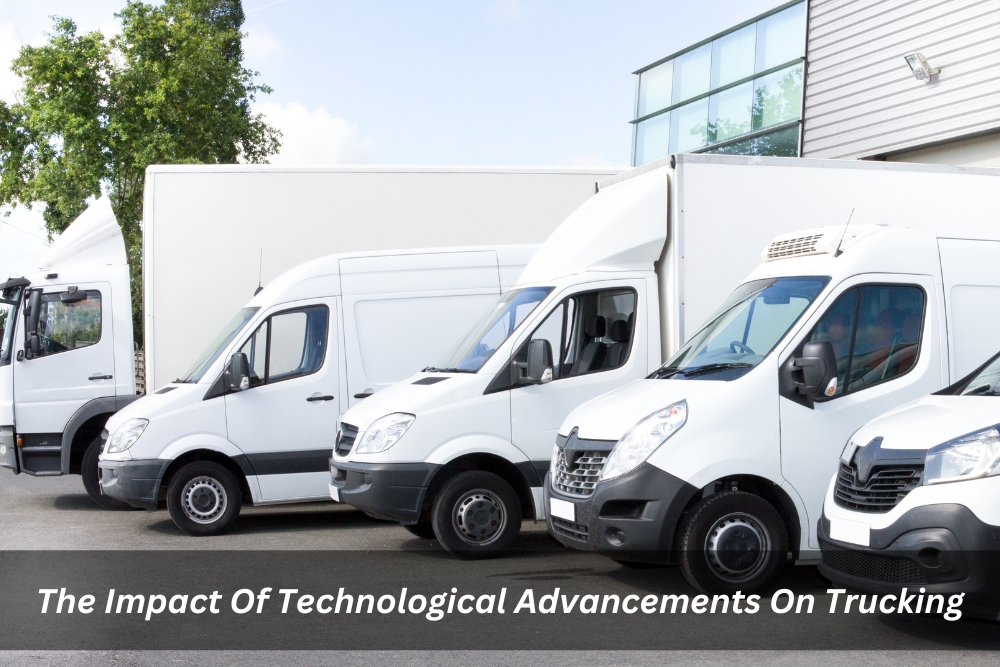In recent years, the trucking industry has undergone a significant transformation, thanks to rapid technological advancements. From autonomous vehicles to real-time tracking systems, technology is revolutionising the way goods are transported across the country. In this article, we’ll delve into how these advancements are reshaping the trucking industry, the benefits they bring, the challenges faced during implementation, and what the future holds for trucking in the era of technology.
How is technology revolutionising the trucking industry?
In an era of rapid technological evolution, the trucking industry finds itself at the forefront of transformative changes. From the advent of autonomous vehicles to the implementation of real-time tracking systems, technology is revolutionising the way goods move across the country.
- Autonomous vehicles
One of the most talked-about technological advancements in the trucking industry is the development of autonomous vehicles. These trucks, equipped with state-of-the-art sensors and artificial intelligence, have the potential to reshape the entire logistics landscape. They can operate without a human driver, relying on advanced navigation systems to transport goods from point A to point B.
- Real-time tracking systems
Another game-changer in the trucking industry is the advent of real-time tracking systems. These systems leverage GPS technology to provide accurate and up-to-the-minute information about the location and status of each truck in a fleet. This not only allows for better route planning and optimisation but also enables shippers and customers to track their shipments in real-time.
- Predictive analytics
Technology has empowered the trucking industry with the ability to harness vast amounts of data for predictive analytics. By analysing historical data and current trends, trucking companies can make informed decisions about routes, maintenance schedules, and fuel efficiency. Predictive analytics help optimise operations, reduce downtime, and enhance overall fleet management.
What are the benefits of using technology in trucking?
In the dynamic landscape of modern transportation, embracing cutting-edge technology has become a pivotal strategy for the trucking industry. Here are the tangible benefits that technology brings to the world of trucking.
- Increased efficiency
One of the primary benefits of integrating technology into the trucking industry is the significant boost in efficiency. Autonomous vehicles, real-time tracking systems, and predictive analytics collectively contribute to streamlined operations. Trucks can take more direct routes, avoid traffic congestion, and optimise fuel consumption, resulting in faster and more cost-effective deliveries.
- Enhanced safety
Technology plays a crucial role in improving safety standards within the trucking industry. Advanced driver assistance systems, collision avoidance technologies, and fatigue monitoring tools contribute to a safer working environment for truck drivers. Autonomous vehicles, with their ability to react quickly to potential hazards, have the potential to reduce accidents caused by human error.
- Cost reduction
Technology has the power to drive down operational costs in the trucking industry. Autonomous vehicles eliminate the need for human drivers, saving on labour expenses. Real-time tracking systems help optimise routes and reduce fuel costs. Predictive analytics enable proactive maintenance, minimising the risk of costly breakdowns. As a result, trucking companies can operate more efficiently and competitively in the market.
How can you prepare for the future of trucking with the LR Licence training program?
In light of the evolving landscape in the trucking industry, preparing for the future involves staying ahead of technological advancements. The LR Licence training program offers a strategic approach to equip truck drivers with the skills needed to navigate the changing industry. This program not only covers traditional driving techniques. It also includes modules on operating and managing autonomous vehicles, understanding real-time tracking interfaces, and adapting to the integration of predictive analytics.
By enrolling in the LR Licence training program, truck drivers can proactively prepare for the future of trucking, ensuring they are well-versed in the latest technologies shaping the industry. This training program goes beyond the basics, empowering drivers to embrace the benefits of technology and contribute to the efficiency and safety of the transportation sector.
What are the challenges of adopting technology in trucking?
While the benefits of incorporating technology into the trucking industry are clear, there are also significant challenges that come with the adoption of these advancements.
- Initial investment
The upfront cost of implementing new technologies, such as autonomous vehicles or advanced tracking systems, can be a barrier for many trucking companies. The LR Licence training program addresses this challenge by preparing drivers to effectively utilise these technologies, maximising the return on investment for both individuals and companies.
- Workforce adaptation
The transition to a technologically advanced trucking industry requires the workforce to adapt to new tools and systems. Truck drivers may need additional training to operate autonomous vehicles or to navigate real-time tracking interfaces. The LR Licence training program recognises the importance of workforce adaptation and provides comprehensive training to bridge the skills gap.
- Cybersecurity concerns
With the increasing reliance on interconnected technologies, the trucking industry has become more vulnerable to cybersecurity threats. Hacking attempts on autonomous vehicles or real-time tracking systems can pose significant risks to the integrity of the supply chain. The LR Licence training program includes modules on cybersecurity awareness, ensuring that drivers are equipped to navigate the digital landscape securely.
What does the future of trucking hold with technology?
As technology continues to advance, the future of the trucking industry looks promising. Here are some key trends that are likely to shape the industry in the years to come:
- Further automation
The future of truck driving is on the brink of transformation as fully autonomous trucks are poised to proliferate. As technology advances and regulations adapt, the widespread adoption of self-driving trucks is imminent. This evolution has the potential to reshape the roles of truck drivers, emphasizing a shift toward monitoring and managing autonomous systems.
- Integration of artificial intelligence
Artificial intelligence (AI) will play an increasingly integral role in the trucking industry. AI algorithms will be used to analyse data, predict maintenance needs, and optimise logistics operations. Smart decision-making powered by AI will contribute to even greater efficiency and cost-effectiveness in the transportation of goods.
- Sustainable technologies
With a growing emphasis on environmental sustainability, the trucking industry is likely to embrace technologies that reduce its carbon footprint. Electric and hydrogen-powered trucks, along with advancements in aerodynamics and fuel efficiency, will become more prevalent. The integration of sustainable technologies aligns with global efforts to create a greener and more environmentally friendly transportation sector.
Conclusion
To sum up, technological advancements are reshaping the trucking industry, bringing about increased efficiency, enhanced safety, and cost reduction. While challenges such as initial investment, workforce adaptation, and cybersecurity concerns exist, the future holds exciting possibilities. The continued development of autonomous vehicles, real-time tracking systems, and artificial intelligence will propel the trucking industry into a new era of innovation and sustainability. As the technology evolves, it is essential for trucking companies and drivers to stay agile, adapt to changes, and embrace the opportunities that come with the integration of technology into their operations. Enrolling in programs like the LR Licence training program is a proactive step towards preparing for the future and thriving in the dynamic landscape of the trucking industry.
Are you ready to navigate the future of trucking with confidence and competence? Core Truck Driving School is your gateway to mastering the skills needed to excel in the evolving landscape of the trucking industry. In alignment with the insights provided in our comprehensive article, Core Truck Driving School offers a specialised training program that goes beyond traditional driving techniques. Our program is designed to equip drivers with the expertise to operate and manage autonomous vehicles, understand real-time tracking interfaces, and seamlessly adapt to the integration of predictive analytics.
As the industry embraces cutting-edge technologies, staying ahead is not just an advantage; it’s a necessity. Take the proactive step towards preparing for the future of trucking by enrolling in Core Truck Driving School today. Embrace the opportunities presented by technological advancements, enhance your efficiency, and contribute to the safety and sustainability of the transportation sector. Your journey to success in the trucking industry starts here at Core Truck Driving School. Enroll now and drive into the future with confidence! Contact us today to kickstart your transformative journey.


